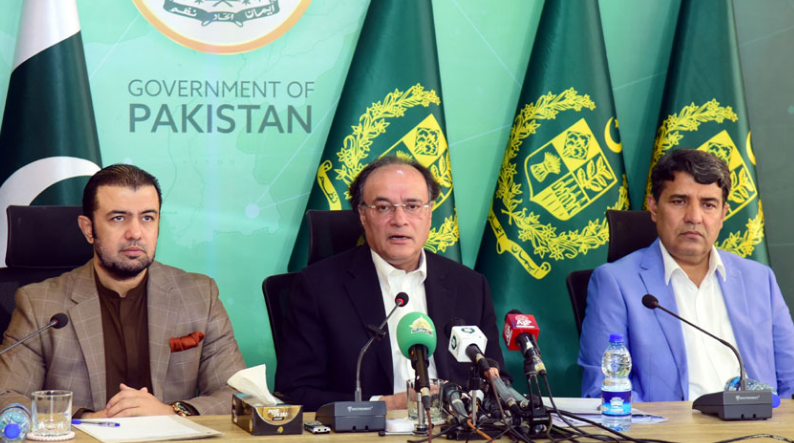Islamabad (Web Desk/Agencies): Federal Minister for Finance and Revenue, addressed the changing trade policies and tariffs under the administration of President Donald Trump, stating that Pakistan was committed to deepening its long-term strategic partnership with the United States (US).
Addressing a press conference in Islamabad, he revealed that Pakistan was in the process of finalizing recommendations, which would be presented to the Prime Minister. Upon approval, Pakistan plans to send a high-level delegation to Washington to communicate its intentions of establishing a sustained and strategic partnership with the US.
In his press conference, the minister outlined that two committees had been formed, one a steering group headed by the finance minister and the other a working group led by the Secretary of Commerce.
“These groups have been holding continuous meetings, seeking to turn challenges into opportunities,” Aurangzeb said, adding that the government viewed the situation as both a challenge and an opportunity, with efforts underway to create a constructive framework that would facilitate discussions with the US administration.
Aurangzeb went on to discuss the economic stability that Pakistan had achieved, emphasizing that it was a necessary foundation for future growth.
He highlighted that the country had managed to stabilize its economy, particularly on the external front, where foreign exchange reserves had risen due to robust remittances.
“Exports also remained strong, showing a growth rate of about 7%,” the minister said, adding that by the end of June, the foreign exchange reserves would exceed $13 billion.
On the domestic front, the minister shared that inflation had dropped to a record-low 0.7%, marking the lowest level in six decades.
He also pointed to improvements in business confidence and investor sentiment, underpinned by decreasing mark-up rates, which had eased conditions for industries.
“The government's broader economic strategy, which is focused on export-led, production-led, and private sector-driven growth, is designed to increase foreign exchange reserves, enhance business confidence, and implement essential structural reforms,” the finance minister said.
Aurangzeb also outlined progress in the government's efforts to privatize state-owned enterprises.
He noted that 24 such enterprises had been transferred to the Privatization Commission, and efforts to restructure the Pakistan International Airlines (PIA) were on track to relaunch within the month.
Aurangzeb said that the economic activity had picked up, reflected in an increase in government spending, which reached Rs 870 billion compared to Rs 720 billion in the previous year.
He placed significant emphasis on the importance of export-led growth, urging all sectors of Pakistan's economy to increase their exports.
The finance minister pointed to the automotive sector, which had begun exporting, as an example of this emerging trend.
On the international front, Aurangzeb discussed the recent success in concluding a six-month review with the International Monetary Fund (IMF) under the Extended Fund Facility (EFF).
“This review was completed successfully, with all quantitative and structural benchmarks being met, including the historic passage of the agriculture income tax through provincial assemblies. As a result, Pakistan expects to receive an additional $1 billion in the upcoming IMF tranche.” he said.
On the fiscal front, Aurangzeb said that Pakistan is on track to reach a tax-to-GDP ratio of 10.6% by June, up from 8.8% in the previous fiscal year, with a goal to gradually raise it to 13.5%.
The finance minister said that the number of tax filers has doubled to 4 million, and the government has implemented measures to simplify the tax filing process, allowing salaried individuals to file their returns without the need for consultants.
He said that the digital transformation in customs enforcement has led to a 16% increase in revenue, and sectors like fertilizers, sugar, and tobacco are now fully covered by the track-and-trace system.
Muhammad Aurangzeb said that the energy sector has also seen significant changes, with one-third of electricity tariffs for industry reduced, which has been acknowledged by the industrial sector.
“The restructuring of power distribution companies and the National Transmission and Despatch Company (NTDC) is being carried out to ensure long-term sustainability,” he added.
The finance minister discussed ongoing efforts to restructure and rightsizing government ministries and departments. He shared that the government had already approved the first two phases of restructuring and was preparing to present the next phases to the cabinet.
“The restructuring process is expected to be completed by June, with an analysis of its impact on the upcoming budget,” he said.
In terms of debt management, Pakistan has successfully extended the maturity period of its debt to an average of 3.5 years, which will result in savings of Rs1 trillion in debt servicing costs.
Aurangzeb expressed the confidence that the country was on the right path toward economic sustainability and was making significant strides in its structural reforms and economic recovery efforts.


